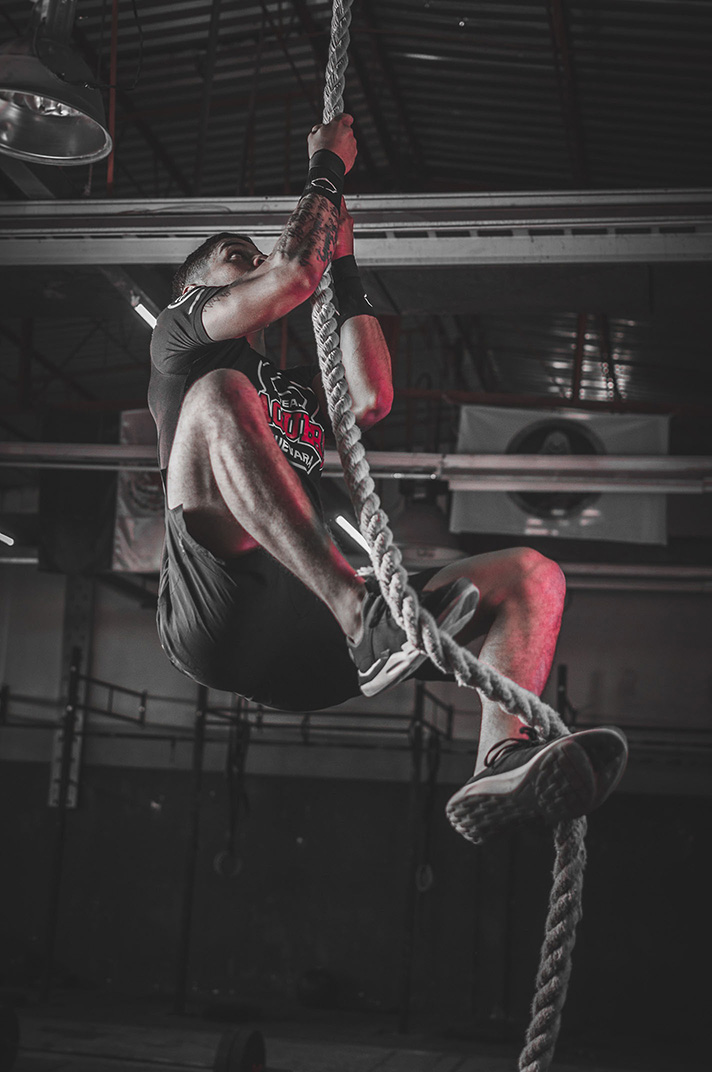No athlete masters double-unders, muscle-ups, and handstand push-ups on day one of CrossFit. Getting these moves down takes practice, patience, and of course a killer training strategy. To give you a leg up, we talked to three CrossFit coaches about the best ways to approach each of these moves.
Build strength and endurance with these functional moves.
Spinning a jump rope under your feet twice per jump—it sounds difficult, but doable. But where do you start? By jumping higher? Bending your knees more? To answer this question, we spoke to Will Lanier, general manager at BRICK Sport Performance Training in New York City, who explained how he coaches his athletes through mastering the double-under. “There are three things that athletes must keep in mind when trying to master this movement—the jump itself, the origin of the motion, and the frequency of practice,” he says.First up: the jump. “Start with higher than normal singles at a really slow pace,” advises Lanier. “Take note of the tempo and the rhythm, how your feet hit the floor between rope passes. This is critical.”
Next, pay attention to your wrists—that’s where the movement starts. “When learning, many athletes tend to make their arms spin like gigantic windmills. Stop. Just stop,” instructs Lanier. “It’s all in the wrist. If you’re looking in the mirror and you see your arms moving like a crazy person trying to do the ‘Single Ladies’ dance, you’re doing it all wrong.”
Lastly, practice every day. “Throwing in two to three minutes of DU practice before every WOD will have you mastering this movement in no time,” says Lanier.
Kick your adrenaline into overdrive with these grueling routines.
The holy grail of CrossFit movements, muscle-ups require you to bring your body from a hanging position below a bar or set of rings to above the bar or rings with your arms extended (it looks like this). Nate Forster, CrossFit coach/competitor and owner of Reebok CrossFit 5th Ave and Reebok CrossFit Miami Beach, provided a game plan for how to improve.
Start by taking note of your grip. “I never teach false grip [wrist placed above the bar or ring rather than below it],” says Forster. “Everyone should learn how to do it from a regular grip.”
Before attempting a muscle-up on the high rings, beginners should practice muscle-up progressions on a low set of rings, and do so on a daily basis. When you’re ready to go for the full muscle-up, give your body time to adjust to the technique. “For five weeks, I suggest doing five sets of muscle-up attempts without even trying to go over the rings,” says Forster. “That muscle memory alone will help you take your muscle-ups to the next level.”
“Athletes should also know that there are three key parts to the muscle-up: the kip, high hips, and fast head through the rings, all of which need to be over exaggerated. That’s when you know you’re doing it right,” says Forster. “Visualize this: There is a mirror on the other side of the rings and you have to break that mirror with your head. Swing as fast as you can, think about bringing your belly button up to the rings, keep your elbows tucked in, and just go.”
Where do you start? Follow our guide.
Handstands are tricky enough on their own, but handstand push-ups require you to not only be upside down, but also press your bodyweight while you’re inverted. We caught up with Nick Vera, head coach and general manager at Mission CrossFit San Antonio to get his expert tips for athletes looking to improve this movement.“We encourage our athletes to spend time holding handstands up against the wall to get used to the position, because often times athletes are disoriented when first practicing handstand push-ups,” says Vera. “The easiest way to figure out how wide to place your hands is to check where your hand positioning is when doing a regular or hand-release push up. This is more than likely the athlete’s strongest pushing position, hence why you default to it when doing push-ups.”
Vera went on to tell us how kipping can help you perfect the handstand push-up. “Those who are proficient in kipping have a huge advantage over those doing strict handstand push-ups,” he says. “Because they will not only save their shoulders by kipping, but they can also potentially move faster if they have mastered the skill.”
We decode the Language of CrossFit. Pro Tips for Tackling CrossFit’s Toughest Moves




